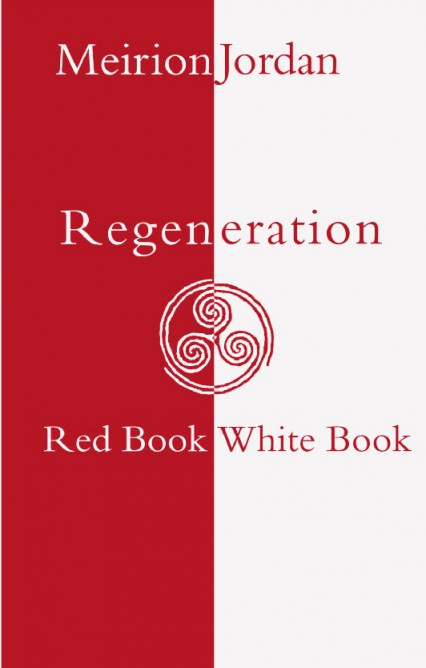Meirion Jordan’s new collection of poetry, Regeneration, is most immediately a handsome and engaging object. Its two sections, entitled ‘Red Book’ and ‘White Book’, are presented back to back and inverted; and each has a separate cover of smooth card – white lettering on a red background for the Red Book and the inverse for the White. Except for this detail, the covers are stylistically identical. Striking in their simplicity, their only adornment is a shakily looping Celtic spiral.
To appreciate the considered materiality – the tangibility – of Regeneration as a printed book is to gain, without reading a word of its contents, cognisance of Jordan’s literary project. Its two distinct parts allude to the Red Book of Hergest and The White Book of Rhydderch – the medieval Welsh manuscripts that encompass the texts now known as the The Mabinogion, which, as Jordan explains in his Preface to the Red Book, ‘have come to rest, in archives, well guarded and away from the mainstream of culture’. ‘These poems [Jordan continues] are nonetheless a reminder that their presence is still felt, and that like all other secondhand or discarded books they were once participatory acts.’

by Meirion Jordan
100pp, Seren, £8.99
The palpable presence and confluence of the remote and more recent past – its capacity for regeneration – in the modern world and in present-
Deep under autumn, ten
spadefuls down I found him,
the red king: bloody
with iron and ochre, his head
split from the spade’s heel
snatching at frost
and sugarfine leaves;
his afterlife blazed
and crackled under my boots.
[. . .]
Regeneration
[. . .] he stood splaying
his gifts of flints and torcs
over the garden’s rucked,
leafless squares, where I left him
turning to the wind’s hum,
into the crow-
Culhwch and Olwen is thought to be the first work of prose to feature the legendary figure of Arthur. In the long poem that comprises the White Book, Jordan sensitively turns over the now ‘well-
his paradox to be water
and vessel, the voyager plumbing
those dark, unreachable years.
Arthur’s ‘paradox’ is foundational to Regeneration’s White Book: fluid and elusive – his story endlessly refracted by the stories of others – he also simultaneously functions as a ‘vessel’ for personal and cultural reawakening and reflection. As Jordan reveals in the Preface to the White Book, ‘I wish to explore how [the] [. . .] fundamentally distant world of Arthur relates to the one we live in, and how the links between the inevitable demise of Arthur and our own farewells to whatever parts of our lives we are forced to leave in the past may be re-
Arthur
was my king:
before the names, the places where sunlight undifferentiated
touched waters I was the dream I woke
& that was a beginning
Meirion Jordan joins a long line of writers and artists to have drawn inspiration and relevance from the stories of King Arthur and the literature of the Red Book of Hergest and White Book of Rhydderch. And yet, in its own way, Regeneration also marks ‘a beginning’ – another captivating phase in the perpetual life-cycle of myth and text.










